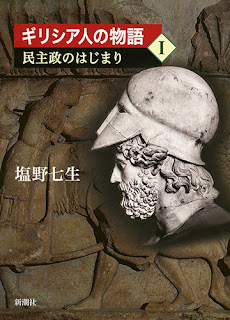- I like traveling.
London New York Paris
- I do Kendo with my daughter.
-----------------------------------------------------
history of ancient Roma
"RES GESTAE POPULI ROMANI"
Nanami Shiono
I started reading this novel in October 2014 and finished on 31st JAN 2016.
Total 43 volume
 |
| 1 |
1.1
1.2
14-16,Augustus
17-20,Tiberius,Caligula,Claudius,Nero
21-23,Vespasian,Titus,Domitian,
24-26,Nerva,Trajan,Hadrian,Antoninus Pius
 |
| 2 |
 |
| 3 |
29,30,Marcus Aurelius,Commodus
35,Diocletianus "tetrarchy"
36-37,Constantine the Great "relocating the capital from Rome to Constantinople"
38-39,Julianus
40,Theodosius [Ambrosius]
41,Eastern,Western Roman Empire established
42,AD476,Western Roman Empire collapsed
43,JustinianusI conquested Roma.SPQR disappeared
SPQR : Senatus Populusque Romanus
-----------------------------------------------------
Story of Republic of Venice (AD697-1797)
Total 6 volume
 |
| 4 |
Vol.1_Birth of Republic of Venice(AD697), Fourth Crusade (AD1202?04)
Vol.2_The Merchant of Venice
Vol.3_Rival,Genova
Vol.4_Ottoman Turks
Vol.5_Age of Discovery, The rise of Spain,Portugal
Vol.6_ Fall of Venice due to the Napoleonic Wars
 |
| 5 |
 |
| 6 |
history of ancient Greece
I started reading this novel in June 2018.
Vol.1(Hardcover)_The beginning of democracy
Vol.2(Hardcover)_Maturity and collapse of democracy
Vol.3(Hardcover)_New power, Alexander The Great
Athenian democracy developed around the fifth century BC in the Greek city-state (known as a polis) of Athens, comprising the city of Athens and the surrounding territory of Attica, and is often described as the first known democracy in the world. Other Greek cities set up democracies, most following the Athenian model, but none are as well documented as Athens'.
It was a system of direct democracy, in which participating citizens voted directly on legislation and executive bills. Participation was not open to all residents: to vote one had to be an adult, male citizen, i.e., not a foreign resident, a slave or a woman, and the number of these was "probably no more than 30 percent of the total adult population."[1]
The longest-lasting democratic leader was Pericles. After his death, Athenian democracy was twice briefly interrupted by oligarchic revolutions towards the end of the Peloponnesian War. It was modified somewhat after it was restored under Eucleides; the most detailed accounts of the system are of this fourth-century modification rather than the Periclean system. Democracy was suppressed by the Macedonians in 322 BC. The Athenian institutions were later revived, but how close they were to a real democracy is debatable. Solon (594 BC), Cleisthenes (508/7 BC), and Ephialtes (462 BC) contributed to the development of Athenian democracy. Cleisthenes broke up the power of the nobility by organizing citizens into ten groups based on where they lived rather than on their wealth.
Niccolo Machiavelli
-----------------------------------------------------
Leonardo da Vinci
 |
| 7 |
-----------------------------------------------------
Michelangelo |
| 8 |
-----------------------------------------------------
Fall of Constantinople-----------------------------------------------------
 |
Pantheon, Rome |
 |
Florence Cathedral |
 |
Doge's Palace |
 |
Palazzo Vecchio |
Ave maria
Celine Dion
Andre Rieu (1:45)
Nobuyuki Tsujii BBC Proms full Blind Pianist
MAO ASADA Sochi Olympic 2014 FS (NBC)









0 件のコメント:
コメントを投稿